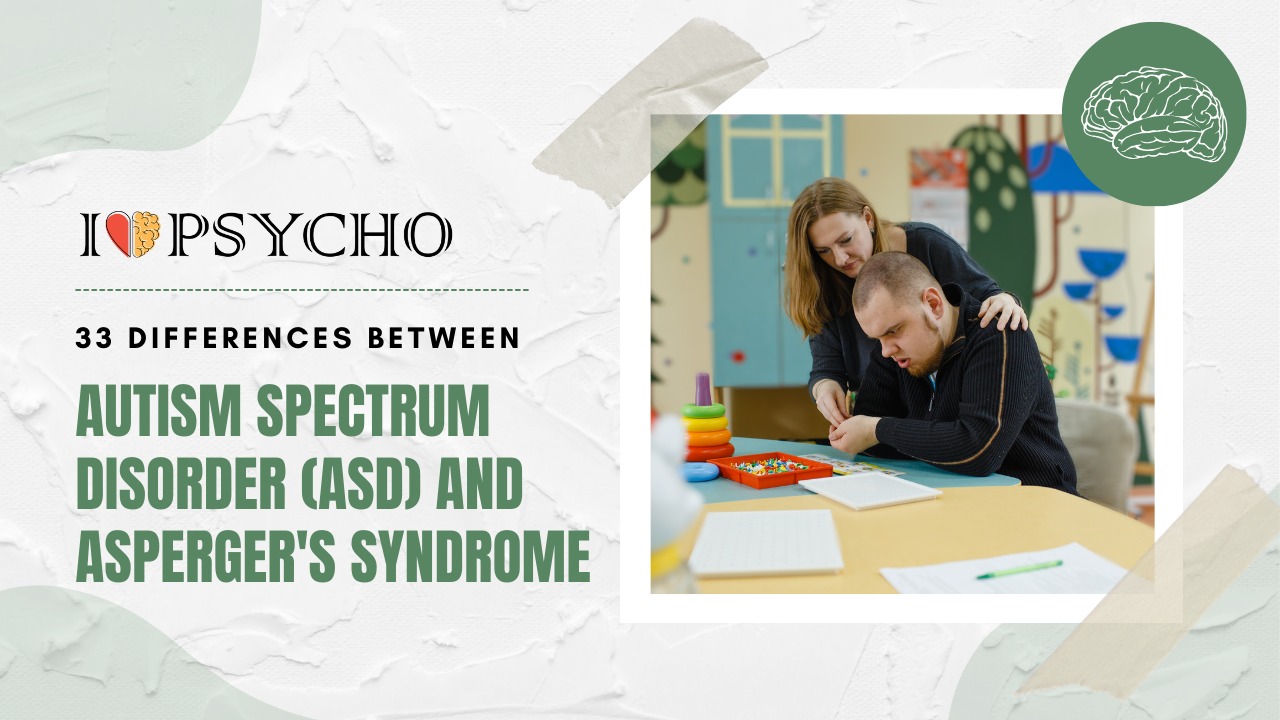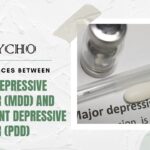With advances in knowledge, Autism Spectrum Disorder (ASD) and Asperger’s Syndrome are now combined under the label ASD in the Diagnostic and Statistical Manual of Mental Disorders (DSM-5). Despite this categorization, some illnesses have subtle distinctions. ASD is a neurodevelopmental condition with many social communication and behavior signs. It ranges in intensity and appearance. Asperger’s Syndrome was once a milder ASD. One difference is linguistic development. Asperger’s patients frequently have normal to excellent language abilities, while others may have language impairments.
Also different are cognitive and intellectual talents. While Asperger’s was previously associated with normal to above-average IQ, ASD can encompass a wider spectrum of intelligence. Both illnesses cause social interaction issues, albeit to different degrees. Aspergers may have trouble comprehending social standards, resulting in uncomfortable encounters. ASD can cause serious issues with relationships, emotions, and reciprocal communication.
ASD and Asperger’s share sensory sensitivity, although their effects differ. Asperger’s and ASD patients may have sensory aversions or preferences that severely impact their everyday lives. Both diseases involve repetitive behaviors and restricted interests, although the degree varies. Asperger’s sufferers maybe passionate about some areas yet not follow rigorous schedules or repeated actions.
Developmental milestones can help identify these diseases. Due to its modest symptoms, Asperger’s was commonly identified later in childhood. Because of its more severe and varied symptoms, ASD can be diagnosed sooner, often in toddlerhood. In conclusion, ASD and Asperger’s Syndrome are now considered one, yet they are still distinct. Language development, intelligence, social interaction, sensory sensitivity, repetitive behaviors, and diagnostic timing are all affected. Recognizing these differences helps customize interventions and support to autism spectrum people’s strengths and needs.
Also Read: Development Language Disorder: Introduction, Symptoms, Causes & more
33 differences between Autism Spectrum Disorder (ASD) and Asperger’s Syndrome:
|
S.No. |
Aspects |
Autism Spectrum Disorder (ASD) |
Asperger’s Syndrome |
|
1 |
Diagnostic category |
Previously considered a separate disorder, now part of the ASD spectrum |
|
|
2 |
Language development |
Varies widely, from nonverbal to highly verbal |
Typically, normal to advanced language development |
|
3 |
Communication skills |
May have limited or impaired communication skills |
Generally, better communication skills, but may still have social difficulties |
|
4 |
Social interaction |
Impaired social interactions and difficulty reading social cues |
Difficulty with social interactions, but less severe than in classic autism |
|
5 |
Restricted interests |
Common, may have intense interests in specific topics |
Can have intense interests but more focused and specific |
|
6 |
Repetitive behaviors |
Often displays repetitive behaviors or movements |
Repetitive behaviors may be present but tend to be less pronounced |
|
7 |
Sensory sensitivities |
Often highly sensitive to sensory stimuli |
May have sensory sensitivities but can be less severe |
|
8 |
Motor skills |
Motor coordination issues are common |
Motor coordination issues may be less pronounced |
|
9 |
Intellectual disability |
A wide range of intellectual abilities, including intellectual disability |
Typically normal to above-average intelligence |
|
10 |
Early language delays |
Many individuals experience significant language delays |
Less likely to experience early language delays |
|
11 |
Age of diagnosis |
Typically diagnosed in early childhood |
Diagnosis often occurs in later childhood or adolescence |
|
12 |
Speech patterns |
May have echolalia (repeating words or phrases) |
Echolalia is less common |
|
13 |
Social motivation |
May have limited social motivation and interest |
Generally, more motivated to engage in social interactions |
|
14 |
Eye contact |
Often avoids or has difficulty with eye contact |
May make eye contact but can find it challenging |
|
15 |
Theory of mind |
May have difficulty understanding others’ perspectives |
Generally, better theory of mind, but still some challenges |
|
16 |
Empathy |
Can have difficulty with empathy and recognizing others’ emotions |
Better empathic abilities, though it may still be impaired |
|
17 |
Verbal communication |
Varies from nonverbal to highly verbal communication |
Typically, good verbal communication skills |
|
18 |
Social reciprocity |
Difficulty with social reciprocity and initiating interactions |
May initiate social interactions but can struggle with reciprocity |
|
19 |
Speech tone and pitch |
Often has atypical speech tone and pitch |
Speech tone and pitch tend to be more typical |
|
20 |
Severity levels |
Range from mild to severe, depending on the individual |
Generally milder in terms of social and communication difficulties |
|
21 |
Routines and rituals |
May have strong attachment to routines and rituals |
Less likely to be rigid with routines and rituals |
|
22 |
Obsessive interests |
Common, with intense interests in specific topics |
Interests can be intense but narrower in focus |
|
23 |
Social support |
Often requires more extensive social support |
May require support, but less intense |
|
24 |
Transition difficulties |
Often experiences difficulties with transitions and changes |
May have some difficulty but less pronounced |
|
25 |
Specialized interventions |
Typically requires specialized autism interventions |
May benefit from social skills training and therapies |
|
26 |
Social isolation |
May experience significant social isolation |
Social isolation is generally less pronounced |
|
27 |
Employment prospects |
Varies widely; some individuals may find it challenging to maintain employment |
Better employment prospects, especially in areas of strong interest |
|
28 |
Emotional regulation |
Difficulty with emotional regulation and meltdowns are common |
Generally better emotional regulation but may still have emotional challenges |
|
29 |
Executive functioning |
May have significant executive function challenges |
Executive function challenges may be less pronounced |
|
30 |
Intellectual pursuits |
May excel in specific intellectual pursuits |
More likely to excel in intellectual pursuits, especially in areas of interest |
|
31 |
Diagnosis criteria |
Diagnosed under the broader ASD criteria |
Previously had separate diagnostic criteria |
|
32 |
Social anxiety |
May experience social anxiety due to difficulties in social interactions |
Social anxiety can be present but may be less severe |
|
33 |
Diagnostic history |
Has seen changes in diagnostic criteria over time, leading to broader recognition |
Historically considered a separate disorder until merged into ASD |
Also Read: 28 Difference between Bipolar Disorder and Cyclothymic Disorder
Frequently Asked Questions (FAQS)
Q.1 What is the difference between Autism Spectrum Disorder (ASD) and Asperger's Syndrome?
Autism Spectrum Disorder (ASD) and Asperger’s Syndrome are united and included under the title “Autism Spectrum Disorder.” Asperger’s patients have normal to above-average verbal and cognitive capabilities, whereas ASD patients have a broader range. Asperger’s people may suffer from nonverbal signs, while those with ASD may have more severe social communication issues, including limited emotional expressiveness.
Q.2 How do ASD and Asperger's Syndrome vary in sensory sensitivity and repetitive behaviors?
Both disorders have sensory sensitivity and repeated behaviors, although they differ. Asperger’s may have fewer limited hobbies and routines than ASD. Both groups engage in repeated behaviors like hand-flapping.
Q.3 What are ASD and Asperger's early indications and markers?
Asperger’s symptoms usually appear in preschool or early school. However, difficulties in speech and social interaction might indicate ASD in infancy. Early signs include poor eye contact, slow pronunciation, and limited name response.
Q.4 Why were ASD and Asperger's Syndrome combined?
The merger of Asperger’s Syndrome and ASD shows a better grasp of autism’s diversity. Recognizing common fundamental traits and spectrum diversity clarifies diagnostic criteria and reduces uncertainty. This modification enables more personalized interventions and assistance for different requirements.
Q.5 How does diagnostic change affect autism treatment and support?
The transition from distinct diagnoses to Autism Spectrum Disorder does not affect treatments and services. Instead, it clarifies spectrum properties and variances. Individualized treatments, therapies, and educational initiatives can meet varied needs and strengths.









